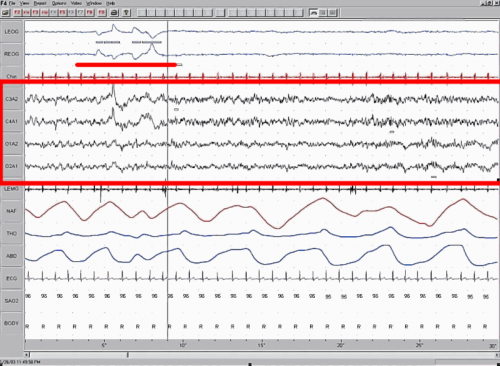January 24, 2014 report
Sleep study suggests placebo effect can impact cognitive skills

(Medical Xpress)—A pair of researchers at Colorado College in College Springs, Colorado has shown that fooling people into believing they've had more or less than average amounts of REM sleep can impact their cognitive skill levels. In their paper published in the Journal of Experimental Psychology: Learning, Memory and Cognition, Christina Draganich and Kristi Erdal describe an experiment they conducted with volunteers that evaluated the relationship between the placebo effect regarding REM sleep and performance on cognitive skills test.
Prior research has shown that shorter time spent in REM sleep tends to impair cognitive skill levels after waking. Conversely, long REM sleep periods have been shown to improve such levels. In this new effort, the researchers set out to determine if the placebo effect might do the same.
To find out, the researchers enlisted the assistance of 164 students from the College and divided them into two groups. Individuals from both groups were asked to lie down and go to sleep while attached to a special machine that could measure the amount of time they were undergoing REM sleep (it actually didn't do anything at all). All participants were also given a seminar before sleeping where REM sleep was explained—they were also told what percentage of the time people normally spend in it while sleeping (on average 20 to 25 percent). It was also explained to them how REM duration had been found to impact cognitive skill levels. After sleeping, volunteers from one group were told they had spent more time than average in REM sleep, while those in the other group were told they'd spent less than the average amount of time in REM sleep. Individuals in both groups were also asked how they thought they had slept before being asked to take some tests that measured cognitive abilities (processing speeds and attention levels).
In analyzing the results, the researchers found that the people who were in the group who were told they'd spent more time in REM sleep did better than average on the cognitive tests while those who were told they got less, did worse—regardless of how well the volunteers thought they had slept.
The study shows, the researchers report, that the placebo effect can indeed by applied to REM sleep and cognitive skill levels, though they are at a loss as to why that is.
More information: Placebo Sleep Affects Cognitive Functioning, Draganich C, Erdal K., J Exp Psychol Learn Mem Cogn. 2014 Jan 13. [Epub ahead of print] www.ncbi.nlm.nih.gov/pubmed/24417326
Abstract
The placebo effect is any outcome that is not attributed to a specific treatment but rather to an individual's mindset (Benson & Friedman, 1996). This phenomenon can extend beyond its typical use in pharmaceutical drugs to involve aspects of everyday life, such as the effect of sleep on cognitive functioning. In 2 studies examining whether perceived sleep quality affects cognitive functioning, 164 participants reported their previous night's sleep quality. They were then randomly assigned to 1 of 2 sleep quality conditions or 2 control conditions. Those in the "above average" sleep quality condition were informed that they had spent 28.7% of their total sleep time in REM, whereas those in the "below average" sleep quality condition were informed that they had only spent 16.2% of their time in REM sleep. Assigned sleep quality but not self-reported sleep quality significantly predicted participants' scores on the Paced Auditory Serial Addition Test and Controlled Oral Word Association Task. Assigned sleep quality did not predict participants' scores on the Digit Span task, as expected, nor did it predict scores on the Symbol Digit Modalities Test, which was unexpected. The control conditions showed that the findings were not due to demand characteristics from the experimental protocol. These findings supported the hypothesis that mindset can influence cognitive states in both positive and negative directions, suggesting a means of controlling one's health and cognition.
© 2014 Medical Xpress


















